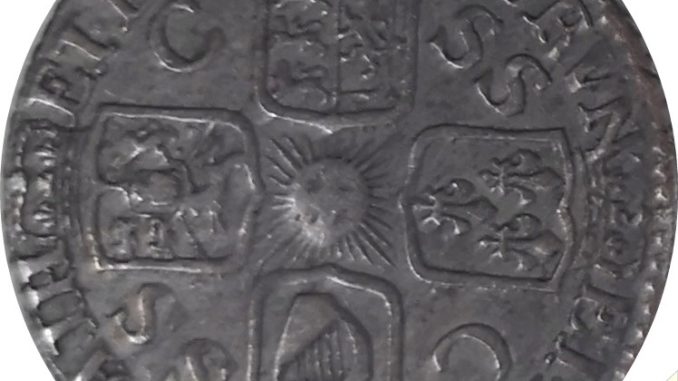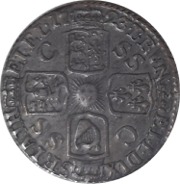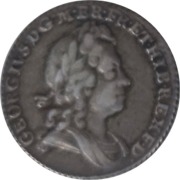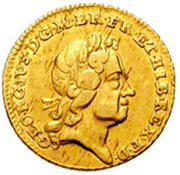
 The 1723 Sixpence SSC - George I
The 1723 Sixpence SSC - George IIn 1722 the South Seas Company discovered silver during their travels. The silver was shipped back and in 1723 Crowns, Half Crowns, Shillings and Sixpences were minted using that silver and marked with "SSC".
Later on the South Seas Company (a British joint-stock company) became involved in a famous financial scandal relating to inflating their stock price which became known as the South Sea Bubble.
There is a variant with large lettering, adds just a little to the price. SCBC: 3652.
The Reverse shows crowned cruciform shields, Garter star at centre, Legend around with date at top and "SS C" in the quarters.
 The Obverse shows a portrait of King George I.
The Obverse shows a portrait of King George I.Image credit: M J Hughes Coins
Mintage: Not known
Minted at The Royal Mint
More information (monarch, year, mint, country, category) can be found below coin listings.
Below are some coins currently being offered on eBay. As an eBay Partner, We may be compensated if you make a purchase.
List items on:
List items on:
Remember 1723 ?
Monarch is King George I. Prime Minister is Robert Walpole (Whig).
George I (1714-1727)
 George I was King of Great Britain and Ireland from 1 August 1714 until his death, and ruler of the Duchy and Electorate of Brunswick-Lüneburg in the Holy Roman Empire from 1698. He was born in Hanover and was second-cousiin to Queen Anne, so it was only the banning of Catholics taking the throne which allowed him to become King.
George I was King of Great Britain and Ireland from 1 August 1714 until his death, and ruler of the Duchy and Electorate of Brunswick-Lüneburg in the Holy Roman Empire from 1698. He was born in Hanover and was second-cousiin to Queen Anne, so it was only the banning of Catholics taking the throne which allowed him to become King.During George's reign, more power was ceeded to Parliament and Sir Robert Walpole was probably the first de-facto Prime Minister. George was succeeded by his son, George II.
The regnal years for George I coins were:
1716:SECVNDO; 1717:TERTIO; 1718:QUINTO; 1720:SEXTO; 1723:DECIMO; 1726:DECIMO TERTIO.
Category: Sixpences
The Sixpence (half a shilling) was a British silver coin that was first minted 1551 and virtually continuously until decimalisation in 1971. They were often known as 'tanners'. They are small coins, the last minted had a diameter of about 19.4 mm.
Specifications:
- Year Minted: 1551-1970
- Diameter: 19.41 mm
- Weight: 2.83g (1816-1970)
- Edge: Milled
- Metal:
- 1551–1816: Silver
- 1816–1920: 92.5% Silver
- 1920–1946: 50% Silver
- 1947–1970 Cupronickel. Zero Silver
In today's money they are 2½p. It doesn't sound much but at the time it was a weeks pocket money! It was a popular coin when in circulation and is now popular with collectors as it has a long history and many nice specimens can be obtained at affordable prices.
Which Mint: The Royal Mint
The Royal Mint is the designated place for the UK to mint coins. It dates back well over 1000 years and is a Government-owned company. Formed in the reign of Alfred the Great about the year 886, during the period 1279-1812 it was generally referred to as The Tower Mint as it was housed at the Tower of London. The Master of The Royal Mint has included famous figures such as Sir Isaac Newton.
Since 2010 it has operated as Royal Mint Ltd, a company owned by HM Treasury, under an exclusive contract to supply all coinage for the UK although it also produces medals and coins for other countries. It is currently located at Llantrisant, Wales.
Country of Origin: United Kingdom
The United Kingdom (UK) is the Union of England, Scotland, Wales and Northern Ireland. It is often refered to as Great Britain (GBR). It has a long, rich history. The orignal coinage was Pounds, Shillings and Pence but since decimalisation on 15 February 1971, it is £1 = 100p, that is One Pound = 100 pence. The coinage of the UK is also a long history, the Royal Mint being established as long ago as 886AD when coins were hammered. Today there is perhaps 30 billion coins in circulation, and many (numismatic) collectors coins and sets are issued frequently in gold, silver and other metals.








